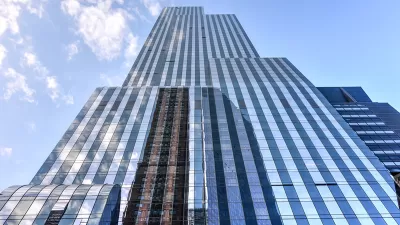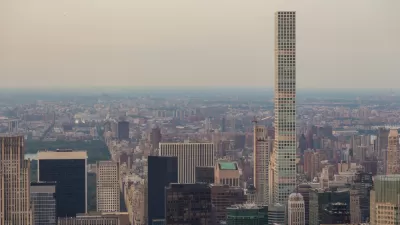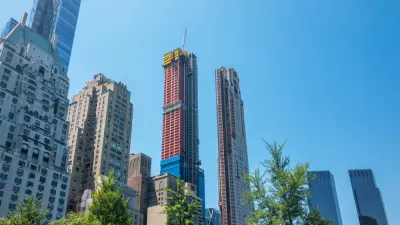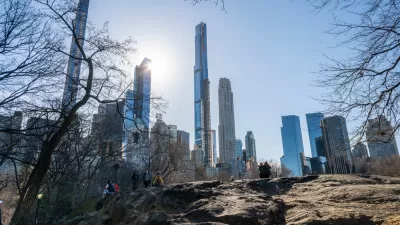The city is responding to controversies surrounding building practices that boost heights of luxury residential towers, while leaving big sections of the buildings empty.

"The de Blasio administration is accelerating plans to tighten a loophole that allows developers to boost the height of luxury apartment buildings," reports Joe Anuta.
"Zoning rules currently allow developers to build mechanical floors with extraordinarily high ceilings, which boosts the height of a building without changing the number of apartments contained within," explains Anuta of the construction techniques that enables the controversial building targeted by the de Blasio administration. "Stacking units on top of a hollow pedestal gives the apartments better views and makes them more expensive."
Anuta raised awareness of the so-called "mechanical voids" and "stilts" at the center of such buildings came in an article from June 2018. "The city initially had said it would regulate mechanical voids by the end of 2018. However, at the behest of City Council officials, the Department of City Planning said last month that it was expanding the scope of the changes to cover more areas of Manhattan, and the more comprehensive set of rules would be ready by the spring," according to Anuta. Now the process of regulating these buildings is expected to change further, as reported in the source article.
FULL STORY: City fast-tracks crackdown on buildings on stilts

Alabama: Trump Terminates Settlements for Black Communities Harmed By Raw Sewage
Trump deemed the landmark civil rights agreement “illegal DEI and environmental justice policy.”

Study: Maui’s Plan to Convert Vacation Rentals to Long-Term Housing Could Cause Nearly $1 Billion Economic Loss
The plan would reduce visitor accommodation by 25% resulting in 1,900 jobs lost.

Planetizen Federal Action Tracker
A weekly monitor of how Trump’s orders and actions are impacting planners and planning in America.

Waymo Gets Permission to Map SF’s Market Street
If allowed to operate on the traffic-restricted street, Waymo’s autonomous taxis would have a leg up over ride-hailing competitors — and counter the city’s efforts to grow bike and pedestrian on the thoroughfare.

Parklet Symposium Highlights the Success of Shared Spaces
Parklets got a boost during the Covid-19 pandemic, when the concept was translated to outdoor dining programs that offered restaurants a lifeline during the shutdown.

Federal Homelessness Agency Places Entire Staff on Leave
The U.S. Interagency Council on Homelessness is the only federal agency dedicated to preventing and ending homelessness.
Urban Design for Planners 1: Software Tools
This six-course series explores essential urban design concepts using open source software and equips planners with the tools they need to participate fully in the urban design process.
Planning for Universal Design
Learn the tools for implementing Universal Design in planning regulations.
Caltrans
Smith Gee Studio
Institute for Housing and Urban Development Studies (IHS)
City of Grandview
Harvard GSD Executive Education
Toledo-Lucas County Plan Commissions
Salt Lake City
NYU Wagner Graduate School of Public Service





























